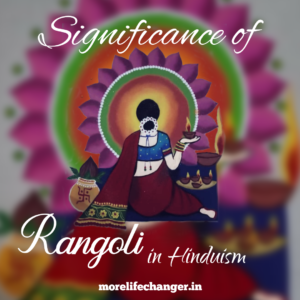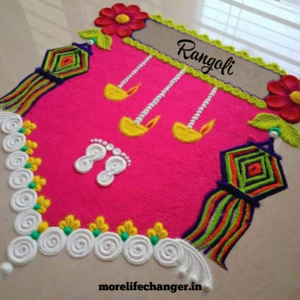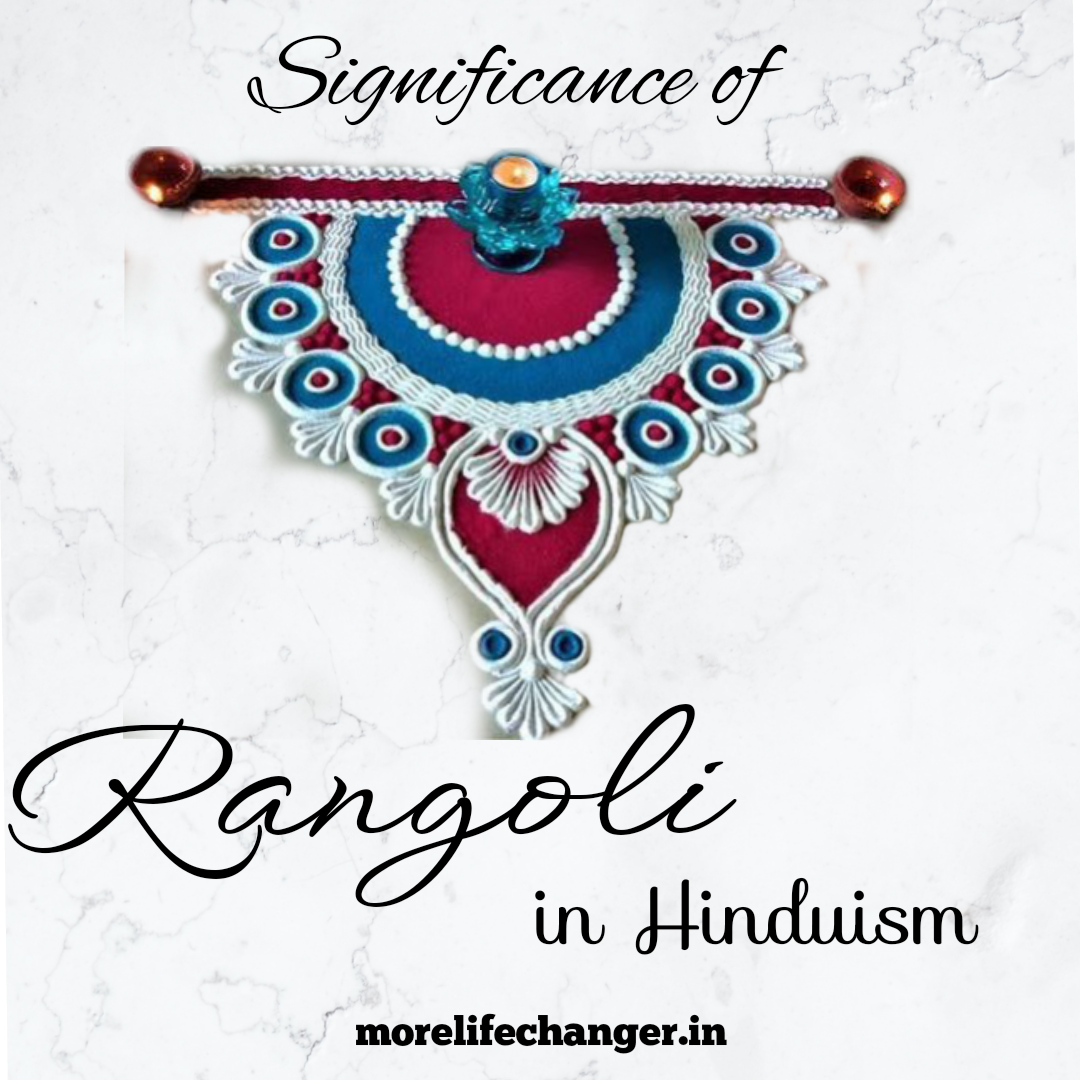Here are 12 Significance of Rangoli in Hinduisms that will amaze you.
While Rangoli is primarily an artistic and cultural practice, these scientific aspects add an interesting dimension to the art form. They highlight the connection between art, mathematics, perception, culture, and the environment, making Rangoli a rich and multifaceted tradition.
Meaning of Rangoli
R- Rainbow of happiness
A- Affection of cherished ones
N- Nourishment of top meals
G- Glory in each area
O- the Overwhelming achievement
L- Lasting appropriate health
I- immediately smile
A very glad and wealthy Deepavali!
Scientific facts about Rangoli
Rangoli is a traditional Indian art form in which patterns or designs are created on the ground using colored powders, flower petals, rice, or other materials. While Rangoli is primarily a cultural and artistic practice, there are some scientific aspects related to this beautiful art form. Here are a few scientific facts about Rangoli:
1. Symmetry and Geometry:
Rangoli designs often exhibit intricate patterns and symmetrical shapes. The creation of these designs requires an understanding of geometric concepts such as symmetry, balance, and proportion. The use of mathematical principles and geometric elements in Rangoli designs showcases the connection between art and mathematics.
2. Visual Perception and Color Psychology:
As rangoli designs are visually appealing and can have an impact on our perception. Moreover the use of vibrant colors and the arrangement of patterns can create optical illusions. Also it affect the way we perceive the design. In fact different colors also evoke specific emotions and moods. Thus leading to a connection between color psychology and the visual impact of Rangoli.
3. Cultural Significance:
Rangoli is deeply rooted in Indian culture and traditions. It is considered a form of decorative art that welcomes guests and deities into the home. The act of creating Rangoli involves not only artistic skills but also cultural values and beliefs. It serves as a way to express cultural identity and preserve cultural heritage.
4. Environmental Awareness:
Traditionally, Rangoli designs were created using natural materials like rice flour, colored powders made from spices, and flower petals. These materials are eco-friendly and biodegradable, making Rangoli an environmentally sustainable art form. In recent times, there has been a growing emphasis on using organic and natural colors to create Rangoli, promoting environmental consciousness.
5. Social Engagement:
Rangoli is often created collectively, with family members or neighbors coming together to design and fill the patterns. This collaborative aspect of Rangoli encourages social engagement, bonding, and a sense of community. It provides an opportunity for people to interact, share creativity, and strengthen relationships.
Also read : Diwali the festival of light and science and Significance of 5 days in Diwali
Eco friendly Rangoli
Creating eco-friendly Rangoli designs is an excellent way to celebrate the festival while being mindful of the environment. Here are some ideas for making eco-friendly Rangoli:
Natural Materials:
Instead of using synthetic colors, opt for natural materials like rice flour, turmeric powder, vermillion, or colored powders made from flowers, leaves, or spices. These natural materials are biodegradable and environmentally friendly.
Flower Petals:
Collect flower petals from your garden or use wilted flowers to create beautiful Rangoli designs. You can arrange the petals in intricate patterns or create colorful outlines. Fresh petals can be used, but using wilted flowers helps to avoid wastage.
Rice or Pulses:
Plain white rice or colored rice can be used to create Rangoli designs. You can also use colored pulses like split lentils or colored grains to add texture and variety to your design. Afterward, the rice or pulses can be easily recycled or used as bird feed.
Organic Colors:
If you prefer using colored powders, choose organic, chemical-free colors. These eco-friendly colors are made from natural ingredients and are safe for the environment. You can find organic Rangoli colors available in the market or make your own using natural dyes.
Reusable Stencils:
Instead of creating Rangoli freehand, you can use reusable stencils made from eco-friendly materials like cardboard or wood. These stencils can be used multiple times, reducing the need for wastage and ensuring consistency in your designs.
Compostable Base:
Consider using a compostable base for your Rangoli design. You can create the base using organic materials like rice flour mixed with turmeric powder or clay. Once the festival is over, the base can be easily composted or used as fertilizer for plants.
Minimalistic Designs:
Choose simpler and smaller Rangoli designs that require fewer materials. By keeping the design minimalistic, you can conserve resources and minimize waste.
The key is to be creative and innovative while using eco-friendly materials for your Rangoli designs. By adopting these practices, you can celebrate Diwali in an environmentally conscious way. Also helps in reducing the impact on nature and promoting sustainability.
Also read : Diwali the festival of light and science and Significance of 5 days in Diwali
68 Amazing Quotes on Rangoli
“Moreover rangoli is the art that fills the canvas of life with vibrant colors and patterns.”
“Rangoli is a form of meditation that allows the mind to find peace and harmony amidst the chaos of the world.”
“In every stroke of rangoli, lies the artist’s imagination, creativity, and love for beauty.”
“Rangoli is the language of celebration, where colors and patterns speak louder than words.”
“Rangoli is a reflection of the rich cultural heritage and traditions of India. In fact it captures the essence of festivals and auspicious occasions.”
“With every grain of sand and every sprinkle of color, rangoli brings good fortune and positive energy into our homes.”
“Rangoli is a way to invite prosperity and good luck, as it adorns our doorsteps with beauty and grace.”
“Moreover Rangoli is not just an art form; it is a way to express gratitude to the universe for the abundance in our lives.”
“Rangoli is the symphony of colors, where each design tells a unique story and spreads joy to all who behold it.”
“In fact Rangoli is a bridge that connects the past with the present, showcasing the timeless beauty of Indian culture.”
Quotes on Rangoli
“Rangoli is the gentle whisper of creativity, transforming simple patterns into exquisite works of art.”
“Through rangoli, we paint our dreams on the canvas of reality, infusing every stroke with hope and positivity.”
“Rangoli is a celebration of unity, as different colors come together to create a harmonious masterpiece.”
“In the vibrant tapestry of rangoli, we find a reflection of the diversity and unity of our society.”
“Rangoli is a dance of colors, where each design gracefully moves across the canvas, enchanting all who witness its beauty.”
“The beauty of rangoli lies not only in its intricate designs but also in the love and devotion poured into its creation.”
“Rangoli is an expression of gratitude towards nature, as we use natural materials to create breathtaking art.”
“Rangoli is an invitation to joy, as it welcomes prosperity, happiness, and good fortune into our lives.”
“The art of rangoli teaches us patience, perseverance, and the beauty of imperfection, as each design unfolds in its own unique way.”
“Rangoli is the language of celebration, where colors and patterns come alive, narrating stories of tradition, culture, and love.”
Mesmerizing quotes on Rangoli

“Rangoli is like a kaleidoscope, where patterns and colors blend together, creating a mesmerizing visual symphony.”
“In the world of rangoli, every design is a masterpiece, crafted with love and adorned with beauty.”
“Rangoli is the art of spreading joy, as it brightens up the surroundings and uplifts the spirits of those who admire it.”
“Rangoli is a celebration of the divine, as we create intricate designs to honor gods and goddesses.”
“Through rangoli, we connect with our roots, keeping our traditions alive and passing them on to the next generation.”
“Rangoli is the symphony of celebration, where colors dance and patterns sing, filling our hearts with joy.”
“As Rangoli is the canvas of imagination, where each dot and line tells a story, woven with threads of creativity.”
“Rangoli is a reflection of the artist’s soul, an expression of their innermost thoughts and emotions.”
“In the art of rangoli, we find solace and peace, as we immerse ourselves in the beauty of creation.”
“Rangoli is the language of harmony, where colors blend seamlessly, representing the unity of all things.”
Festive quotes on Rangoli
“Rangoli is the celebration of the present moment, as we create beauty in the here and now.”
“In the canvas of rangoli, we find a reflection of the infinite possibilities that lie within us.”
“Rangoli is a bridge that connects generations, as we pass down the art form from one hand to another, preserving our cultural heritage.”
“Through rangoli, we express our gratitude to Mother Earth, as we use her vibrant colors to create our intricate designs.”
“Rangoli is the art of spreading happiness, as it brings a smile to the faces of those who encounter its beauty.”
“Rangoli is a form of meditation in motion, where the artist finds stillness and peace amidst the rhythmic patterns they create.”
“Through rangoli, we celebrate the beauty of impermanence. Also each design is fleeting, reminding us to embrace the transient nature of life.”
“Rangoli is the language of celebration, where colors and patterns come together to express the joy and festivity of special occasions.”
“In the art of rangoli, we discover the power of small acts of creativity to transform our surroundings and uplift our spirits.”
“Rangoli is a visual symphony that transcends language and culture, speaking to the universal human desire for beauty and expression.”
Quotes on beauty of Rangoli
“Rangoli is a testament to the beauty that emerges when creativity meets tradition.”
“In the world of rangoli, every dot and line is a brushstroke of love and devotion.”
“Rangoli is an art form that celebrates the harmony between human creativity and the beauty of nature.”
“Through rangoli, we weave stories of celebration, love, and togetherness, creating a tapestry of memories.”
“Rangoli is the expression of our inner joy, as we paint the canvas of life with colors of happiness.”
“In the intricate patterns of rangoli, we find a reflection of the intricate beauty of life itself.”
“Rangoli is a language that transcends barriers, connecting hearts and spreading joy wherever it is created.”
“Through rangoli, we honor the divine, expressing our gratitude for the blessings in our lives.”
“Rangoli is a dance of colors, where each stroke and design comes alive, telling a story of its own.”
“In the art of rangoli, we find a beautiful blend of tradition, culture, and individual creativity.”
Quotes on creativity of Rangoli
“Rangoli is a canvas where the artist’s imagination knows no boundaries, and colors dance freely.”
“In the symphony of rangoli, every color and pattern harmonizes to create a visual masterpiece.”
“Rangoli is a celebration of life’s fleeting moments, capturing beauty in the ephemeral nature of its designs.”
“Through rangoli, we paint the world with love, spreading joy and positivity one vibrant pattern at a time.”
“Rangoli is a reflection of the artist’s soul, where thoughts, emotions, and dreams find expression in colors and shapes.”
“In the art of rangoli, we discover that even the simplest of designs can bring immense joy and captivate our hearts.”
“Rangoli is an invitation to pause, appreciate the present moment, and find beauty in the little things around us.”
“Through rangoli, we create a pathway of beauty, guiding our steps towards a world filled with love and harmony.”
“Rangoli is an art form that teaches us patience, focus, and the importance of embracing imperfections.”
“In the language of rangoli, every stroke is a whisper of creativity that speaks volumes about the artist’s spirit.”
Quotes on Rangoli art
“Rangoli is a celebration of the unity between art and spirituality, where creativity becomes a divine expression.”
“Through rangoli, we pay homage to the beauty of nature. As each design reflects the splendor of the world around us.”
“Rangoli is a symphony of colors that fills the air with joy, inspiring happiness and positive energy.”
“In the canvas of rangoli, we discover the power of a single dot. As it evolves into intricate patterns, symbolizing growth and transformation.”
“Rangoli is a testament to the human capacity for creation, as we transform simple materials into breathtaking works of art.”
“Through rangoli, we embrace the interconnectedness of all beings, as every stroke contributes to the larger tapestry of life.”
“Rangoli is a language of celebration that transcends cultural boundaries, bringing people together through the beauty of art.”
“In the art of rangoli, we find a meditative practice that nurtures the mind, body, and soul, fostering a sense of inner peace.”
“Rangoli is a reflection of the artist’s unique perspective, as they infuse their designs with their own personal touch and style.”
“Through rangoli, we honor the ancient traditions and customs, preserving the wisdom and beauty of our cultural heritage.” – Unknown
Quotes that represents Rangoli as geometry of universe
“Rangoli is the language of celebration, where colors and patterns dance together, creating a symphony of joy.”
“In the art of rangoli, every stroke is a brush of positivity that brightens the world around us.”
“Rangoli is a pathway of creativity, where imagination leads us to discover the beauty within and around us.”
“Through rangoli, we paint our dreams and aspirations, infusing them with the colors of hope and possibility.”
“Rangoli is a reminder that even in chaos, beauty can emerge, transforming the ordinary into the extraordinary.”
“In the canvas of rangoli, we find a reflection of the artist’s soul, as their emotions and thoughts come to life in vivid colors.”
“Rangoli is a celebration of the interconnectedness of all things, as each design weaves together different elements into a harmonious whole.”
“Through rangoli, we honor the divine within us, as we create intricate designs that mirror the sacred geometry of the universe.”
“Rangoli is an art form that encourages us to embrace the present moment, as each design is fleeting and unique, just like life itself.”
“In the world of rangoli, every creation is a masterpiece, showcasing the artist’s talent, creativity, and love for beauty.”
Quotes on amazing rangoli

“Rangoli is not just a vibrant art form; it’s a reflection of the colorful tapestry of life, where each intricate design symbolizes the beauty in diversity.”
“In the canvas of celebration, rangoli is the brushstroke of joy, weaving patterns of happiness and unity on the floor of our hearts.”
“As each grain of color meets the canvas, rangoli becomes a silent poet, expressing the essence of festivity through the language of vibrant hues.”
“Rangoli is the language of celebration, where every stroke speaks the universal dialect of joy, harmony, and the timeless beauty of traditions.”
“The floor adorned with rangoli is not just an artwork but a canvas of emotions, where the colors tell stories of togetherness, love, and shared moments.”
“Rangoli is a symphony of colors, a dance of creativity that transforms ordinary spaces into extraordinary expressions of festivity and cultural richness.”
“In the delicate artistry of rangoli, we find the beauty of impermanence, reminding us to appreciate the transient nature of life’s vibrant moments.”
“As each dot and line merge into a masterpiece, rangoli teaches us that even the simplest elements, when combined with care, can create something truly extraordinary.”
“Rangoli is the poetry of celebration, where the floor becomes a canvas, and each design becomes a verse in the grand ballad of traditions.”
“The beauty of rangoli lies not just in its visual appeal but in the spirit of collaboration and creativity that it inspires, bringing people together in artistic harmony.”
Quotes on Significance of Rangoli in Hinduisms
“In the artistry of rangoli, every color signifies a wish, every curve whispers a story, and every design is a brushstroke in the masterpiece of celebration.”
“As the vibrant powders blend in rhythmic patterns, rangoli becomes a dance of colors, echoing the lively spirit of festivities in every swish and swirl.”
“Rangoli is the silent expression of joy, the dance of hues that transforms ordinary spaces into extraordinary realms of celebration and cultural exuberance.”
“The floor becomes a canvas, and rangoli is the artist’s brush, creating a visual poem that narrates tales of tradition, unity, and the timeless celebration of life.”
“Like petals falling into place, rangoli is a floral cascade of creativity, adorning the ground with the essence of beauty and the fragrance of festivity.”
“In the intricate patterns of rangoli, we find the art of balance, each element harmonizing to create a visual symphony that resonates with the soul.”
“Rangoli is a celebration in color, where every dot and line symbolizes the myriad emotions that come together to form the kaleidoscope of life.”
“As rangoli adorns the floor, it invites us to step into a world of tradition, where every footprint leaves an impression on the canvas of cultural heritage.”
“Rangoli is the language of hospitality, welcoming guests with open arms and a floor adorned with the vibrant symbols of festivity and warmth.”
“As the powders meet the ground, rangoli becomes a testament to the transient beauty of the present moment, urging us to cherish the ephemeral nature of celebration.”
Quotes on Hindus culture- rangoli
“Rangoli is the poetry written with colors, a lyrical dance of pigments that tells stories of joy, tradition, and the art of coming together.”
“In the intricate details of rangoli, we find the beauty of unity, where diverse colors and patterns harmonize to create a masterpiece of togetherness.”
“Rangoli is a canvas of celebration, where each design is a stroke of creativity and each color is a note in the melody of festivity.”
“As the fingers gracefully craft patterns on the floor, rangoli becomes a silent prayer for prosperity, harmony, and the timeless bond of shared moments.”
“Rangoli is not just an art form; it’s a celebration in motion, where every step and every dance move echoes the joy of life’s vibrant rhythms.”
“The vibrant circles and graceful lines of rangoli mirror the circles of life, reminding us of the interconnectedness of moments and the beauty of continuity.”
“Rangoli is the embodiment of tradition, a visual poem that connects the past with the present, narrating tales of culture, heritage, and celebration.”
“In the delicacy of rangoli patterns, we find the strength of simplicity, proving that even the smallest details can contribute to the grandeur of celebration.”
“As the colors blend and patterns unfold, rangoli becomes a living art, evolving with each moment and reflecting the dynamic spirit of festivity.”
“Rangoli is the silent storyteller of celebrations, where the canvas of the floor becomes a narrative of love, happiness, and the timeless traditions we hold dear.”
Rangoli in different Language
Hindi: रंगोली (rangoli)
Tamil: கோலம் (kolam)
Telugu: ముగ్గులు (muggulu)
Kannada: ರಂಗೋಲಿ (rangoli)
Malayalam: പൂക്കോലം (pookkalam)
Bengali: আলপনা (alpana)
Marathi: रंगोली (rangoli)
Gujarati: રંગોળી (rangoli)
Punjabi: ਰੰਗੋਲੀ (rangoli)
Urdu: رنگولی (rangoli)
Dutch: Rangoli (pronounced similarly)
Russian: Ранголи (pronounced rangoli)
Chinese (Simplified): 布置彩画 (pronounced bù zhì cǎi huà)
Japanese: ランゴリ (pronounced rangori)
Korean: 랑골리 (pronounced ranggolli)
Arabic: الرانغولي (pronounced al-ranguli)
Swahili: Rangoli (pronounced similarly)
Greek: Ράνγκολι (pronounced rangkoli)
Thai: รังโกลี (pronounced rangkoli)
Ukrainian: Ранголі (pronounced rangoli)
Hebrew: רנגולי (pronounced rangoli)
Icelandic: Rangoli (pronounced similarly)
Bulgarian: Ранголи (pronounced rangoli)
Pease join discussion on Facebook about world facts and its secret.

